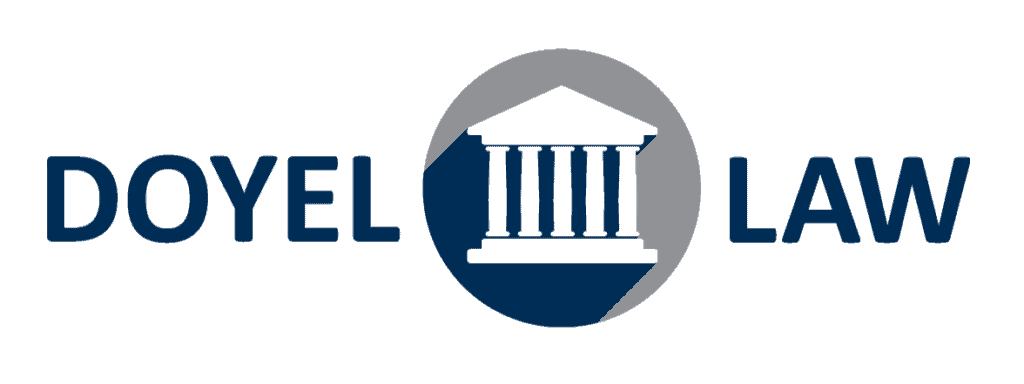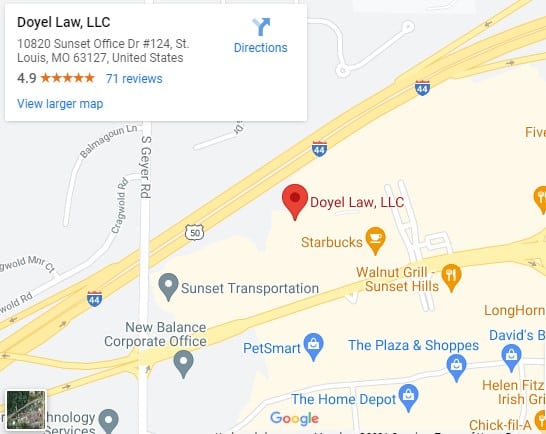Eliminate dischargeable debt in a Chapter 13 bankruptcy with legal help
Chapter 13 bankruptcy can be complex and confusing for people struggling with debt. If you’re facing financial difficulties, it’s crucial to understand how Chapter 13 bankruptcy can help you get out of debt.
In this article, we’ll break down the concept of Chapter 13 dischargeable debt in Sunset Hills, MO, in simple terms. We’ll also explain why getting help from our experienced attorneys from Doyel Law is critical when filing for Chapter 13 bankruptcy.
What is Dischargeable Debt in Chapter 13 Bankruptcy?
Chapter 13 bankruptcy is a legal process that allows people to reorganize their debts and create a payment plan they can afford. One of the most important things to understand about Chapter 13 bankruptcy is the concept of dischargeable debt. Dischargeable debt can be eliminated or “discharged” at the end of your Chapter 13 bankruptcy case if you meet all the requirements and complete your payment plan.
Here are some common examples of Chapter 13 dischargeable debt:
- Credit card debt: If you have credit card debt, Chapter 13 bankruptcy can help you get out of it. Any remaining credit card debt will be discharged when you complete your payment plan.
- Medical bills: Medical bills can be a major financial burden, especially if you have lots of these. Chapter 13 bankruptcy can help you pay off your medical bills, and any remaining unpaid medical bills will be discharged at the end of your case.
- Personal loans: Personal loans, including payday loans, can also be discharged through Chapter 13 bankruptcy.
- Collection accounts: Collection accounts are debts that have been sent to collections. Chapter 13 bankruptcy can help you clear these debts, and any remaining unpaid collection accounts will be discharged at the end of your case.
- Certain tax debts: Specific older tax debts may be discharged through Chapter 13 bankruptcy. However, not all tax debts are dischargeable. Speaking with our bankruptcy attorney to determine if your tax debts are dischargeable is crucial.
How Can I Be Eligible For a Chapter 13 Bankruptcy?
In the context of Chapter 13 bankruptcy, it’s essential to understand the eligibility criteria and necessary steps for discharging debts. Specific conditions must be met to qualify for debt discharge:
- Types of Debt: Chapter 13 primarily addresses consumer debts, including credit card balances, medical bills, personal loans, and specific tax debts. Business-related debts and those arising from fraudulent or malicious actions are generally not eligible.
- Successful Repayment Plan: Achieving the discharge of your debts within Chapter 13 hinges on successfully completing your repayment plan. Typically lasting between three to five years, this plan outlines how you will gradually pay off a chunk of your debts.
- Priority and Secured Debts: While dischargeable debts can be eliminated, certain obligations, such as priority debts (e.g., child support and specific taxes) and secured debts (e.g., mortgage or auto loans), may necessitate full repayment or alternate arrangements.
- Demonstrating Good Faith: Showing sincere commitment to adhere to the repayment plan is crucial. That entails making timely payments and following the court-approved plan diligently.
- Credit Counseling: Before initiating a Chapter 13 case, mandatory credit counseling from an approved agency is required. Furthermore, post-filing, completing a financial management course is necessary.
- Previous Discharge: If you have already received a Chapter 13 discharge within a specified timeframe, typically two years, you may not qualify for another discharge.
Adhering to these requirements is essential for achieving the discharge of eligible debts after your Chapter 13 bankruptcy case, offering you the opportunity for a fresh financial start.
What Debts are Not Dischargeable in a Chapter 13 Bankruptcy?
Not all debts can be included or discharged in Chapter 13 bankruptcy. Grasping the types of debts excluded from Chapter 13 bankruptcy is vital for individuals seeking financial relief through this process. We outline common categories of debts that are typically not covered or dischargeable in a Chapter 13 bankruptcy below:
- Priority Debts: Chapter 13 bankruptcy does not grant discharge of priority debts. These are obligations holding a special status under the bankruptcy code and must be fully repaid as part of your repayment plan. Priority debts encompass child support, alimony, specific tax liabilities, and government-imposed fines.
- Secured Debts: Secured debts, like mortgage and auto loans, usually remain unaffected by Chapter 13 bankruptcy. While they can be included in your repayment plan, you must arrange to fulfill them according to their original terms or negotiate new terms with the creditor.
- Criminal Fines and Restitution: Debts stemming from criminal fines, court-ordered restitution, or penalties linked to criminal activities are not subject to discharge through Chapter 13 bankruptcy. These obligations demand full payment.
- Student Loans: Typically, student loans are not dischargeable in bankruptcy, including Chapter 13. However, in rare circumstances, you might be able to discharge student loans if you can prove an undue hardship, which is a challenging legal standard to meet.
- Debts from Fraud or Misrepresentation: Debts incurred through fraudulent or deceptive actions, such as obtaining credit through false information or embezzlement, are generally ineligible for discharge. Creditors can contest the discharge of such debts. If they establish fraud, the debts remain.
- Certain Tax Debts: While some older tax debts may be dischargeable under specific conditions, recent tax liabilities are typically not dischargeable in Chapter 13 bankruptcy. Addressing these debts requires separate arrangements with tax authorities.
- Debts Incurred After Filing: Any debts accumulated after initiating Chapter 13 bankruptcy proceedings are not included in your repayment plan and are ineligible for discharge.
Understanding these exclusions is vital for managing expectations and making informed decisions when navigating Chapter 13 bankruptcy.
The Importance of Working With an Experienced Attorney
Although the prospect of debt relief through Chapter 13 bankruptcy may seem appealing, the process can be intricate and riddled with potential challenges. Here’s why it’s advisable to consider getting the help of our skilled attorney from Doyel Law when addressing Chapter 13 dischargeable debt in Sunset Hills, MO:
- Professional Guidance: The bankruptcy code is intricate, and the regulations governing Chapter 13 dischargeable debt can be complicated. Our proficient attorney can offer expert guidance, ensuring you clearly understand which debts can be discharged and which cannot.
- Tailored Solutions: Each financial situation is unique. Our skilled lawyer will evaluate your specific circumstances and assist you in crafting a personalized Chapter 13 repayment plan. This tailored approach aims to maximize the discharge of your debts while safeguarding your assets.
- Navigating Legal Procedures: Filing for Chapter 13 bankruptcy involves many legal steps and deadlines. Missing a critical step or submitting incorrect paperwork can pose risks to your case. Our bankruptcy attorney will help ensure you meet all requirements and deadlines, reducing the likelihood of complications.
- Creditor Protection: Upon initiating Chapter 13 bankruptcy proceedings, an automatic stay is enacted, preventing creditors from pursuing collection actions against you. Our lawyer will manage communications with creditors, offering you peace of mind during this challenging period.
- Error Mitigation: Errors in your bankruptcy filing can result in case dismissal or unintended debts not being discharged. Our experienced attorney will work diligently to minimize such errors, increasing the probability of a successful outcome.
- Post-Bankruptcy Guidance: Even after your Chapter 13 bankruptcy concludes, you may encounter questions or issues related to your discharged debts. Our knowledgeable lawyer can provide ongoing support and guidance to assist you in rebuilding your financial life.
Working with our knowledgeable attorney on Chapter 13 dischargeable debt in Sunset Hills, MO, can significantly enhance your prospects of successfully navigating the complexities of the bankruptcy process and securing a brighter financial future.
Our Lawyers at Doyel Law Can Help You Manage Your Dischargeable Debts
Chapter 13 dischargeable debt is a valuable resource for individuals burdened by overwhelming financial responsibilities. Nevertheless, effectively maneuvering through the intricacies of Chapter 13 bankruptcy necessitates the knowledge and experience of an experienced attorney.
We have a dedicated team of well-versed professionals here at Doyel Law, located in Sunset Hills, MO. We are committed to guiding you through the entire process, ensuring you secure the debt relief you deserve.
You don’t have to confront the challenges of Chapter 13 bankruptcy on your own. Let us be your partners in achieving a fresh financial start. We encourage you to contact us today to arrange a consultation, taking the initial step toward a more promising financial future. Aside from bankruptcy, our law firm also offers legal service on family law concerns (e.g., legal separation and child support) and estate planning.


